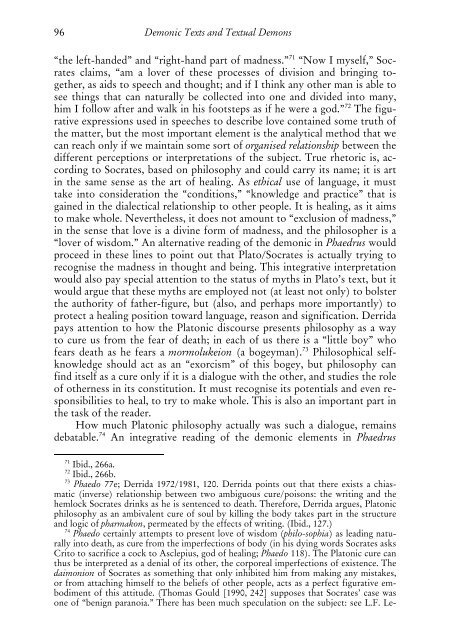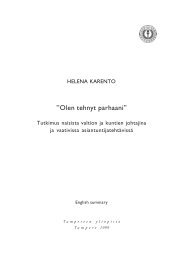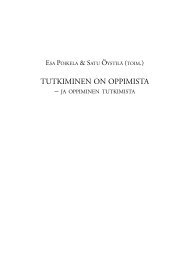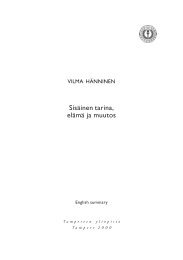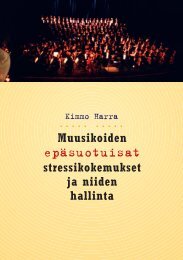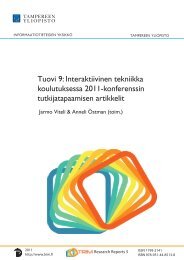Note on this edition: this is an electronic version of the 1999 book ...
Note on this edition: this is an electronic version of the 1999 book ...
Note on this edition: this is an electronic version of the 1999 book ...
Create successful ePaper yourself
Turn your PDF publications into a flip-book with our unique Google optimized e-Paper software.
96Dem<strong>on</strong>ic Texts <strong>an</strong>d Textual Dem<strong>on</strong>s“<strong>the</strong> left-h<strong>an</strong>ded” <strong>an</strong>d “right-h<strong>an</strong>d part <strong>of</strong> madness.” 71 “Now I myself,” Socratesclaims, “am a lover <strong>of</strong> <strong>the</strong>se processes <strong>of</strong> div<strong>is</strong>i<strong>on</strong> <strong>an</strong>d bringing toge<strong>the</strong>r,as aids to speech <strong>an</strong>d thought; <strong>an</strong>d if I think <strong>an</strong>y o<strong>the</strong>r m<strong>an</strong> <strong>is</strong> able tosee things that c<strong>an</strong> naturally be collected into <strong>on</strong>e <strong>an</strong>d divided into m<strong>an</strong>y,him I follow after <strong>an</strong>d walk in h<strong>is</strong> footsteps as if he were a god.” 72 The figurativeexpressi<strong>on</strong>s used in speeches to describe love c<strong>on</strong>tained some truth <strong>of</strong><strong>the</strong> matter, but <strong>the</strong> most import<strong>an</strong>t element <strong>is</strong> <strong>the</strong> <strong>an</strong>alytical method that wec<strong>an</strong> reach <strong>on</strong>ly if we maintain some sort <strong>of</strong> org<strong>an</strong><strong>is</strong>ed relati<strong>on</strong>ship between <strong>the</strong>different percepti<strong>on</strong>s or interpretati<strong>on</strong>s <strong>of</strong> <strong>the</strong> subject. True rhetoric <strong>is</strong>, accordingto Socrates, based <strong>on</strong> philosophy <strong>an</strong>d could carry its name; it <strong>is</strong> artin <strong>the</strong> same sense as <strong>the</strong> art <strong>of</strong> healing. As ethical use <strong>of</strong> l<strong>an</strong>guage, it musttake into c<strong>on</strong>siderati<strong>on</strong> <strong>the</strong> “c<strong>on</strong>diti<strong>on</strong>s,” “knowledge <strong>an</strong>d practice” that <strong>is</strong>gained in <strong>the</strong> dialectical relati<strong>on</strong>ship to o<strong>the</strong>r people. It <strong>is</strong> healing, as it aimsto make whole. Never<strong>the</strong>less, it does not amount to “exclusi<strong>on</strong> <strong>of</strong> madness,”in <strong>the</strong> sense that love <strong>is</strong> a divine form <strong>of</strong> madness, <strong>an</strong>d <strong>the</strong> philosopher <strong>is</strong> a“lover <strong>of</strong> w<strong>is</strong>dom.” An alternative reading <strong>of</strong> <strong>the</strong> dem<strong>on</strong>ic in Phaedrus wouldproceed in <strong>the</strong>se lines to point out that Plato/Socrates <strong>is</strong> actually trying torecogn<strong>is</strong>e <strong>the</strong> madness in thought <strong>an</strong>d being. Th<strong>is</strong> integrative interpretati<strong>on</strong>would also pay special attenti<strong>on</strong> to <strong>the</strong> status <strong>of</strong> myths in Plato’s text, but itwould argue that <strong>the</strong>se myths are employed not (at least not <strong>on</strong>ly) to bolster<strong>the</strong> authority <strong>of</strong> fa<strong>the</strong>r-figure, but (also, <strong>an</strong>d perhaps more import<strong>an</strong>tly) toprotect a healing positi<strong>on</strong> toward l<strong>an</strong>guage, reas<strong>on</strong> <strong>an</strong>d significati<strong>on</strong>. Derridapays attenti<strong>on</strong> to how <strong>the</strong> Plat<strong>on</strong>ic d<strong>is</strong>course presents philosophy as a wayto cure us from <strong>the</strong> fear <strong>of</strong> death; in each <strong>of</strong> us <strong>the</strong>re <strong>is</strong> a “little boy” wh<strong>of</strong>ears death as he fears a mormolukei<strong>on</strong> (a bogeym<strong>an</strong>). 73 Philosophical selfknowledgeshould act as <strong>an</strong> “exorc<strong>is</strong>m” <strong>of</strong> <strong>th<strong>is</strong></strong> bogey, but philosophy c<strong>an</strong>find itself as a cure <strong>on</strong>ly if it <strong>is</strong> a dialogue with <strong>the</strong> o<strong>the</strong>r, <strong>an</strong>d studies <strong>the</strong> role<strong>of</strong> o<strong>the</strong>rness in its c<strong>on</strong>stituti<strong>on</strong>. It must recogn<strong>is</strong>e its potentials <strong>an</strong>d even resp<strong>on</strong>sibilitiesto heal, to try to make whole. Th<strong>is</strong> <strong>is</strong> also <strong>an</strong> import<strong>an</strong>t part in<strong>the</strong> task <strong>of</strong> <strong>the</strong> reader.How much Plat<strong>on</strong>ic philosophy actually was such a dialogue, remainsdebatable. 74 An integrative reading <strong>of</strong> <strong>the</strong> dem<strong>on</strong>ic elements in Phaedrus71 Ibid., 266a.72 Ibid., 266b.73 Phaedo 77e; Derrida 1972/1981, 120. Derrida points out that <strong>the</strong>re ex<strong>is</strong>ts a chiasmatic(inverse) relati<strong>on</strong>ship between two ambiguous cure/po<strong>is</strong><strong>on</strong>s: <strong>the</strong> writing <strong>an</strong>d <strong>the</strong>hemlock Socrates drinks as he <strong>is</strong> sentenced to death. Therefore, Derrida argues, Plat<strong>on</strong>icphilosophy as <strong>an</strong> ambivalent cure <strong>of</strong> soul by killing <strong>the</strong> body takes part in <strong>the</strong> structure<strong>an</strong>d logic <strong>of</strong> pharmak<strong>on</strong>, permeated by <strong>the</strong> effects <strong>of</strong> writing. (Ibid., 127.)74 Phaedo certainly attempts to present love <strong>of</strong> w<strong>is</strong>dom (philo-sophia) as leading naturallyinto death, as cure from <strong>the</strong> imperfecti<strong>on</strong>s <strong>of</strong> body (in h<strong>is</strong> dying words Socrates asksCrito to sacrifice a cock to Asclepius, god <strong>of</strong> healing; Phaedo 118). The Plat<strong>on</strong>ic cure c<strong>an</strong>thus be interpreted as a denial <strong>of</strong> its o<strong>the</strong>r, <strong>the</strong> corporeal imperfecti<strong>on</strong>s <strong>of</strong> ex<strong>is</strong>tence. Thedaim<strong>on</strong>i<strong>on</strong> <strong>of</strong> Socrates as something that <strong>on</strong>ly inhibited him from making <strong>an</strong>y m<strong>is</strong>takes,or from attaching himself to <strong>the</strong> beliefs <strong>of</strong> o<strong>the</strong>r people, acts as a perfect figurative embodiment<strong>of</strong> <strong>th<strong>is</strong></strong> attitude. (Thomas Gould [1990, 242] supposes that Socrates’ case was<strong>on</strong>e <strong>of</strong> “benign par<strong>an</strong>oia.” There has been much speculati<strong>on</strong> <strong>on</strong> <strong>the</strong> subject: see L.F. Le-


